Rockall Q&A: Fishing dispute between Scotland and Ireland
 Alamy
AlamyAn age-old international dispute over a small uninhabited island in the North Atlantic Ocean has flared up, and this time it's between Scotland and Ireland.
Rockall lies 260 miles (418km) west of Scotland's Western Isles.
The UK claims ownership over the outcrop and a 12-nautical-mile territorial sea around it.
"We don't have a claim on it. We don't accept any other sovereign claim on it," Taoiseach (Irish Prime Minister) Leo Varadkar has said.
He made the comments after Scotland's Fisheries Minister Fergus Ewing warned Irish vessels could be boarded for fishing within 12 miles of Rockall.
What is Rockall?
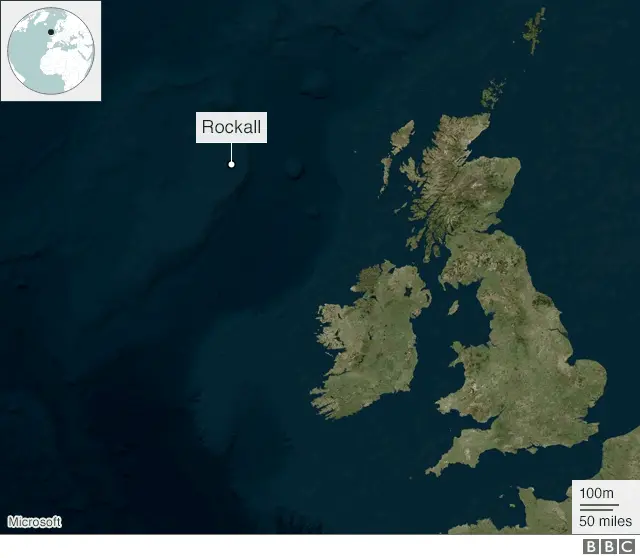
Rockall, an uninhabited islet measuring just 100ft (30m) wide and 70ft (21m) high, is a remnant of an eroded volcano.
It is situated approximately 160 nautical miles (300km) west off St Kilda (a group of Scottish islands) and about 230 nautical miles north-west off Ireland's Donegal coast.
The UK has long claimed ownership of Rockall, but its claim is not recognised by several neighbouring states.
The lucrative seabed around Rockall, rich in oil and gas possibilities as well as fish, has been the subject of rival claims from Ireland, Iceland and Denmark (on behalf of the Danish Faroe Islands).
The first recorded British Royal Navy expedition to the island dates back to 1810.
In 1955, a group of Royal Marines landed on Rockall and claimed it on behalf of Queen Elizabeth by raising the Union flag and cemented a plaque into the rock.
The UK passed its Island Of Rockall Act in 1972, formally incorporating it into Scotland's Western Isles.
However, Irish associations with Rockall may pre-date British expeditions by several centuries.
Legend has it that the Irish monk St Brendan, famed for his Atlantic voyages, described Rockall and its dimensions as far back as the 6th Century.
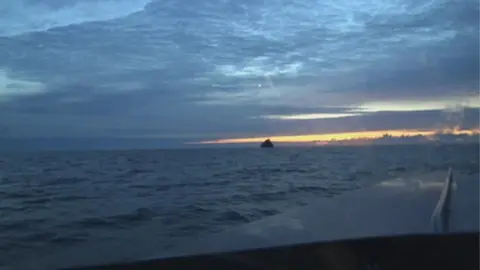
A spokesperson told BBC News NI: "Irish vessels, or any non-UK vessels for that matter, have never been allowed to fish in this way in the UK's territorial sea around Rockall.
"We have provided an opportunity for the Irish government to warn their fishermen not to fish illegally in the area.
"Should the illegal fishing continue, routine enforcement action will be implemented to protect our fisheries interests."
Foreign Minister Simon Coveney said Ireland did not accept a small, uninhabitable rock in the middle of the ocean "represents sovereign territory that you can draw a 12-mile fishing limit around".
He called for a diplomatic resolution, but added: "Don't confuse diplomatic language with weakness."
He confirmed his government will provide legal support to any Irish vessel boarded at Rockall.
Mr Coveney also said Ireland could potentially seek "international arbitration".
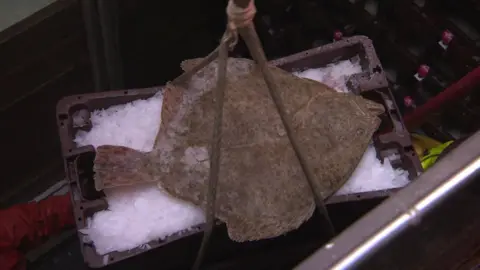
A European Commission spokeswoman told BBC News NI that "the question of sovereignty over Rockall is a matter of international law".
"We understand a dialogue is ongoing and we trust the matter will be resolved by the parties themselves. The provisions of the Common Fisheries Policy apply in all EU waters."
Asked to clarify the commission's stance on ownership of the 12-mile sea, she replied: "According to EU law, there is equal access to [European] Union waters and resources and, in the absence of authorised restrictions, any fishing vessels having an EU quota can legally fish around Rockall."
The Irish government says Scotland first raised the issue in 2017 - the year after the Brexit vote - even though Irish crews have "legitimately" fished around Rockall "unhindered for decades".
But the Scottish government says it has always been against the law for any non-UK vessel to fish within 12 miles of Rockall.
It added there has been "an increase in that illegal activity".
On 31 May, Scotland notified Ireland of intended enforcement action.
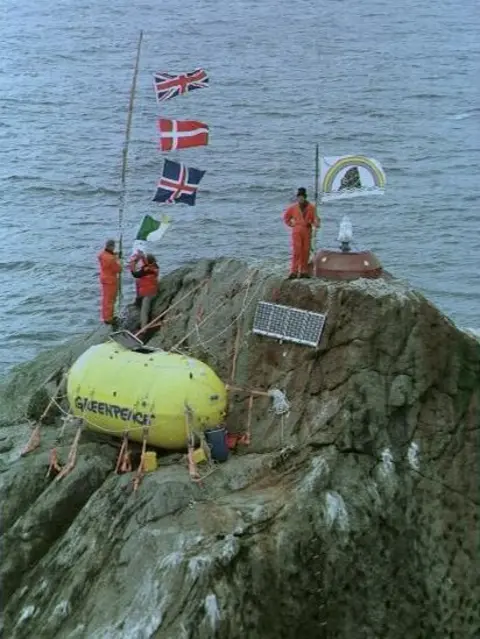 Greenpeace
GreenpeaceBBC News NI asked the Scottish government who would take enforcement action against Irish vessels, and whether or not the Royal Navy would be involved, but has not yet received a response.
The Irish foreign minister said he understood Scottish fishery protection vessels would take initial enforcement action, but added he believed "they have an understanding with the Royal Navy, should they need to use them".
Mr Coveney ruled out sending Irish naval vessels to Rockall and said talks were ongoing to "take the heat out of this situation".
Scotland's First Minister Nicola Sturgeon also called for an "amicable" settlement.
The head of Scotland's largest fishing industry organisation warned Ireland would be "unwise" to pick a fight over Rockall fishing rights ahead of Brexit.
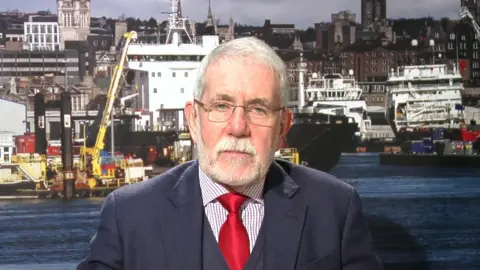
Bertie Armstrong from the Scottish Fishermen's Federation said the UK would soon be an "independent sovereign coastal state, with complete control over all our own waters.
"Any access to those waters will be at the behest of the governments of the land."
"If they do detain any of our vessels, we will fight this tooth and nail - this is an illegal act being carried out by Scotland," said Sean O Donoghue, chief executive of the Killybegs Fishermen's Organisation.
He said Britain was currently a member of the EU and had to adhere to the EU's Common Fisheries Policy.
He also claimed Scotland was in breach of the United Nations Law of the Sea Convention, "which says you can't establish exclusive economic or 12-mile zone around uninhabited outcrops".
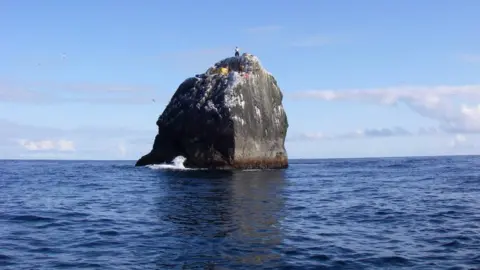 KILDA CRUISES
KILDA CRUISESArticle 121 (3) of UNCLOS states: "Rocks which cannot sustain human habitation or economic life of their own shall have no exclusive economic zone or continental shelf."
The UK Foreign and Commonwealth Office has acknowledged the UNCLOS rule on uninhabitable rocks, in response to a Freedom of Information request in 2012.
But it added such rocks are "entitled to a territorial sea" and confirmed the UK claimed a 12-nautical-mile territorial sea around Rockall.
It is a harsh and inhospitable environment, but a few people have managed to camp on Rockall, albeit temporarily.
In 1985, former British soldier Tom McClean stayed on the rock for 40 days, in a bid to reaffirm Britain's claim to the territory.
In 1997, three Greenpeace campaigners camped for 42 days in protest at oil and gas exploration in the surrounding seabed.
In 2014, Scottish adventurer Nick Hancock set a new record, surviving alone on Rockall for 45 days.
